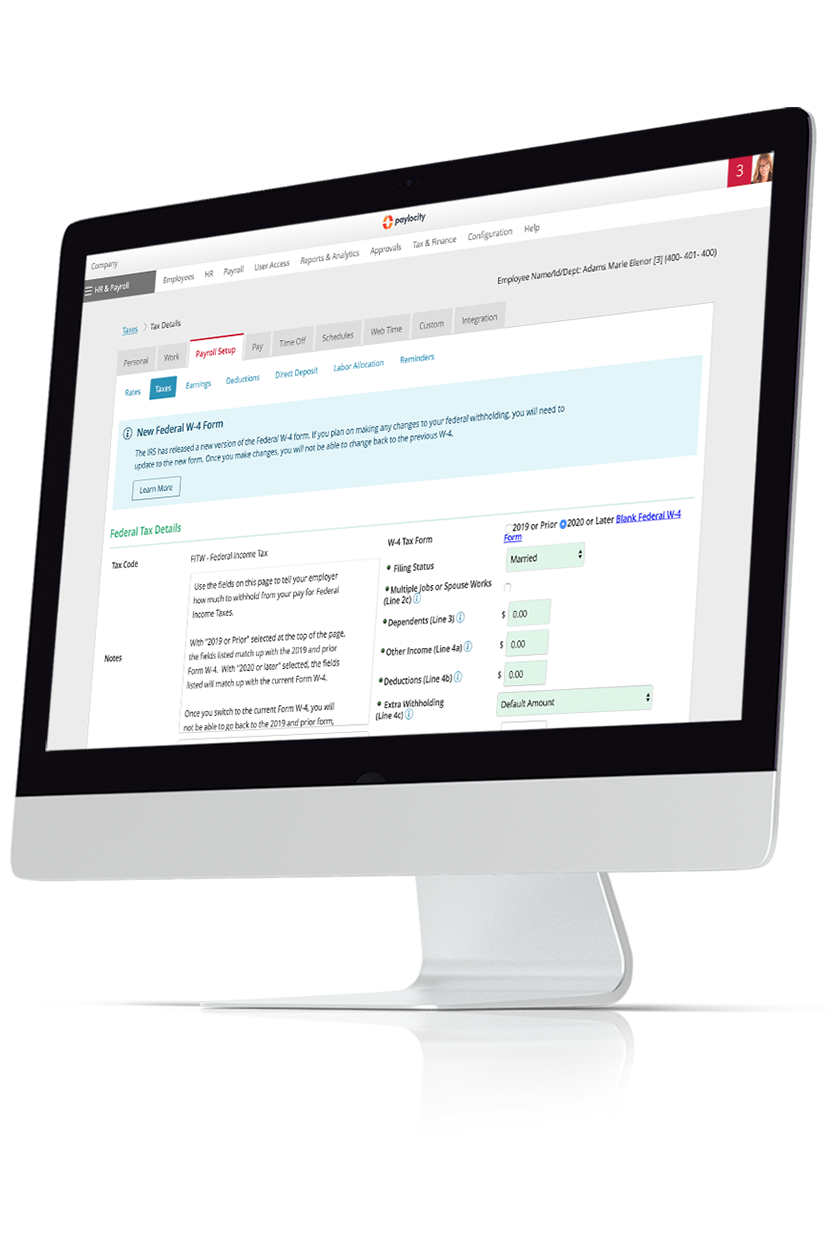New Jersey Payroll Tax Facts
January 15, 2025
Having to comply with unique state taxes and wage laws can make processing payroll doubly daunting. Here’s everything you need to know about these rates and laws for the state of New Jersey.

The Garden State has a slightly complex set of minimum wage rates, which vary based on the nature of an organization’s business. The state also has a Paid Sick Leave program guaranteeing time off to employees within its borders.
When it comes to processing payroll, New Jersey-based organizations must handle the following taxes in addition to those required by the federal government:
- Personal Income (a.k.a. State Income Tax)
- State Unemployment Insurance (SUI)
- Temporary Disability Insurance (TDI)
- Paid Family and Medical Leave (PFML)
- Local Taxes
The below information was last updated January 15, 2025. It is not intended as legal or tax advice.
New Jersey Payroll Tax Rates
New Jersey State Income Tax (SIT)
New Jersey's SIT is progressive, meaning it adjusts based on the income level of the employee paying the tax.
| Filing Status* |
Income Tax Bracket |
2025 Income Tax Rate |
| Single / Married (filed separately) |
$0 - $20,000
|
1.5% of excess over $0.00 |
|
$20,000 - $35,000 |
$300 + 2.0% of excess over $20,000 | |
|
$35,000 - $40,000 |
$600 + 3.9% of excess over $35,000 | |
|
$40,000 - $75,000 |
$795 + 6.1% of excess over $40,000 | |
| $75,000 - $500,000 | $2,930 + 7.0% of excess over $75,000 | |
| $500,000 - $1,000,000 | $32,680 + 9.9% of excess over $500,000 | |
| $1,000,000 or greater | $82,180 + 11.8% of excess over $1,000,000 | |
| Married (filed jointly) / Head of Household / Qualifying Widow(er) / Surviving Partner |
$0 - $20,000 | 1.5% of excess over $0.00 |
| $20,000 - $50,000 | $300 + 2.0% of excess over $20,000 | |
| $50,000 - $70,000 | $900 + 2.7% of excess over $50,000 | |
| $70,000 - $80,000 | $1,440 + 3.9% of excess over $70,000 | |
| $80,000 - $150,000 | $1,830 + 6.1% of excess over $80,000 | |
| $150,000 - $500,000 | $6,100 + 7.0% of excess over $150,000 | |
| $500,000 - $1,000,000 | $30,600 + 9.9% of excess over $500,000 | |
| $1,000,000 or greater | $80,100 + 11.8% of excess over $1,000,000 |
*Refer to Form NJ-W4's instructions and wage chart for details on potentially selecting one of the alternative tax rate schedules.
|
Additional New Jersey SIT Details |
|
|
Supplemental Withholding Computation |
Rates vary based on when supplemental wages are paid:
|
|
Valid Filing Statuses |
|
|
Exemptions |
Number of allowances |
|
Form W-4 |
|
|
Reconciliation Frequency |
Quarterly |
New Jersey State Unemployment Insurance (SUI)
SUI provides unemployment benefits to eligible workers who are unemployed through no fault of their own (as determined by state law) and meet the state’s eligibility requirements.
|
New Jersey SUI Tax Details |
|
|
Taxable Wage Base |
$43,300 |
|
Employee Subject to Tax |
Yes; 0.3825% up to taxable wage base |
|
Rates for Experienced Employers |
0.60% – 6.40% |
|
Rates for New Employers |
3.10%* |
|
Effective Period |
Fiscal Year (July 1 - June 30) |
|
Voluntary Contributions Allowed |
Yes; must be paid within 30 days after rate notice mailing, unless an extension has been granted for up to an additional 60 days or until October 28 of the current calendar year, whichever is earlier. |
*This includes the base SUI rate (2.9825%) and the Workforce Development Partnership Fund rate for employers (0.1175%).
New Jersey Temporary Disability Insurance (TDI)
TDI benefits are funded by employees through mandatory payroll deductions from each paycheck. However, in New Jersey, only employers contribute to the state’s program, and their rates differ based on how long they’ve been operating.
|
New Jersey SDI Tax Details |
|
| Maximum Taxable Employee Earnings | $165,400 |
| Maximum Taxable Employer Earnings | $42,300 |
| Employee Deduction Rate | 0.23% |
| Maximum Employee Deduction Amount | $380.42 |
| Rates for Experience Employers | Varies based on employer's experience rate |
| Rates for New Employers | 0.50% |
New Jersey Paid Sick Leave (PSL) Tax
The state of New Jersey doesn’t require employers to collect PSL taxes, but it does have a program providing such leave to eligible employees:
|
New Jersey PSL Details |
|
| Covered Employers | All |
| Covered Employees | All full-time and part-time employees (with limited exceptions) |
| Exempt Employees |
|
| Accrual Method(s) | One hour of leave per 30 hours worked |
| Annual Accrual Cap | 40 hours |
| Carryover Maximum | 40 hours |
| Frontloading Allowed | Yes |
| FAQs | Earned Sick Leave FAQ |
New Jersey Paid Family and Medical Leave (PFML) Tax
Like SDI, New Jersey’s Family Leave Insurance (FLI) program is funded via mandatory payroll deductions:
|
New Jersey FLI Details |
|
| Covered Employees | All who have made tax contributions to the program, except for federal government employees, out-of-state employees, faith-based organizations, and workers who aren’t hired employees (e.g., independent contractors). |
| Covered Employers |
All
|
| Tax Rate | 0.33% up to wage base limit |
| Wage Base Limit | $165,400 |
| Maximum Leave Available | 12 consecutive weeks or 8 nonconsecutive weeks per 12-month period |
| Wage Replacement | 85% of average weekly wage* up to maximum benefit rate |
| Maximum Benefit Rate | $1,081 per week |
| FAQs | FLI FAQs for Employers |
*Calculated by dividing the employee’s base annual salary by the number of weeks they earned more than $283.
New Jersey Local Taxes
In addition to the state-wide taxes mentioned above, the following cities and localities also have unique tax and/or wage laws.
- Newark has a 1% quarterly tax for employers.
- Jersey City also has a 1% quarterly tax for nonresident employees if the wages earned are $2,500 or more.
Miscellaneous New Jersey Tax Information
New Jersey Reciprocal Agreement(s)
Reciprocal agreements are when workers who live and work in different states are only required to pay taxes to the state where they live. New Jersey currently only has a reciprocal agreement with Pennsylvania, which states that Pennsylvania employers are not required to withhold Pennsylvania SIT from New Jersey residents and vice versa (a certificate of non-residence is required).
New Jersey residents working in Pennsylvania are, though, subject to local Pennsylvania withholding taxes, and may have those taxes included when determining how much to withhold from earnings for New Jersey SIT. In Philadelphia, for example, local withholding taxes can be considered to the point where the employee may be exempt from New Jersey SIT altogether.
New Jersey Minimum Wage Rates
|
Wage Type |
New Jersey Rates |
Federal Rates |
|
Minimum Wage |
$15.49 |
$7.25 |
|
Tipped Minimum Wage |
$5.62 |
$2.13 |
|
Actual Tip Credit |
$9.87 |
$5.12 |
Paying Payroll Taxes in New Jersey
New Jersey Payroll Tax Due Dates
Remittance due dates for New Jersey payroll taxes vary based on the type of tax being paid and the amount of tax owed.
| Tax Type | Frequency | Details |
| Income | Weekly | Employers who owe $10,000 or more in state income tax withholdings from the previous year must remit taxes by the Wednesday following any payday(s) within the preceding week (Sunday through Saturday). For example, if an employee is paid on Monday the 1st, tax withholdings for that paycheck are due by Wednesday the 10th. |
| Monthly/Quarterly |
Employers who don’t meet the criteria for a weekly schedule must remit withheld taxes on a monthly or quarterly basis.
|
|
| Annually | Employers who withhold federal taxes for household workers must report and remit withheld state taxes by January 31 of the following calendar year. | |
| SUI, TDI, and FLI | Quarterly | Payments are due no later than the 30th day of the month after the quarter ends, regardless of whether that date falls on a weekend or national holiday. |
| Local | Quarterly | Payments must be submitted no later than the 30th day of the month after the quarter ends. |
New Jersey Employer Registration
The agencies below can help with your state-based employer registration, including best practices, account numbers, and unemployment information. Contact the Department of Treasury for withholding tax topics and the Department of Labor & Workforce for unemployment tax topics.
|
Registration Details |
Department of Treasury |
Department of Labor & Workforce Development |
|
Phone |
(609) 292-6748 | (609) 292-9292 |
|
Online Registration |
Online Business Registration Page | |
|
Registration Instructions |
Online and Phone Registrations are available. Account numbers will be issued in 3-7 days via the online process or 3 weeks via mail. Note, the same account number for each tax type will be issued under the combined registration. | |
New Jersey Tax Withholding Payment Options
Any employer with a tax liability of $10,000 or more (for any of the above taxes) must submit payments electronically via one of the following methods:
- Automated Clearing House (ACH) transactions
- E-Checks
- Credit Cards
Employers preferring to use ACH transactions must first enroll in the state’s Electronic Fund Transfer (EFT) program.
Additional New Jersey Payroll Tax Resources
- Department of Taxation Homepage
- Department of Revenue and Enterprise Services Homepage
- Department of Labor and Workforce Development Employer Accounts Page
This information is provided as a courtesy and may be updated at any time. It is not intended as legal or tax guidance. If you have questions or concerns, we encourage you to seek the advice of a qualified CPA, tax attorney, or advisor.

Get Taxes Done Right, Without the Stress
We know there's a lot that goes into preparing and filing payroll tax forms. Save time and get support from our expert team. As a Registered Reporting Agent with the IRS, we can help prepare and file all the necessary forms you need to remain compliant - even in the face of changing legislation. Learn more here.